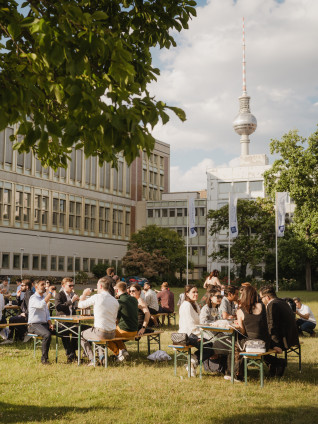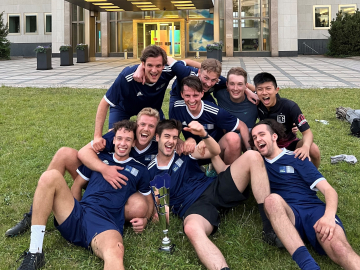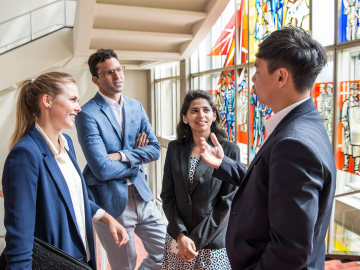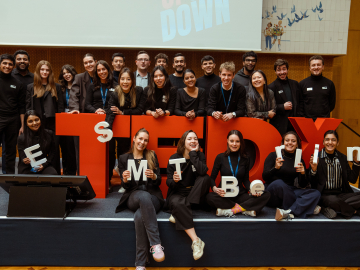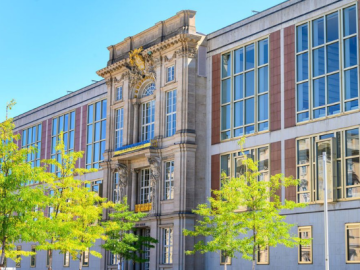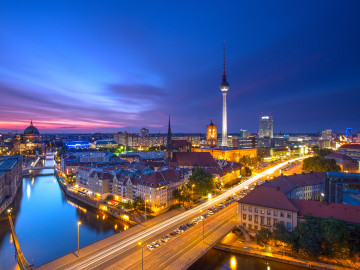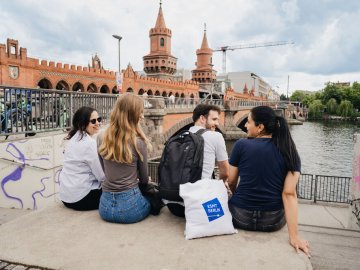As a full-time student at ESMT you can take advantage of our centrally-located campus in the heart of Berlin, exclusive events and student clubs – but you'll also have one of Europe's most celebrated cities at your fingertips, famed for its history, culture and nightlife.
ESMT brings Berlin, Europe’s most pulsating capital, to your fingertips. The campus is in the center of the city, with direct access to every neighborhood. Europe’s most vibrant capital is a center for entrepreneurship, design, cutting-edge architecture, famous nightlife, and unparalleled opportunities for both high-brow and alternative culture. From Currywurst street vendors to top restaurants, your appetite will be satiated in Berlin.
Living in Berlin as a student: At a glance
Berlin is the capital of Germany, the seat of its government and one of Europe's most important cities for entrepreneurship, innovation and tech-startups. But what is it like to study in Berlin?
For a better idea of what student life in Berlin is like, here are some key facts:
- The largest city in the European Union by population, of its 3.85 million inhabitants, around 200,000 are students.
- Berlin ranked as the 7th best city in the world for students in the QS ranking of Best Student Cities for 2026.
- Compared to other capitals, Berlin's cost of living for students is low. We estimate average living costs – per month – to be:
- Health insurance (required): €35 (private) to €139 (public)
- Rent: €400-800 (private room, known as a WG or Wohngemeinschaft) or €1,000+ (apartment)
- Food: €200
- Transport: €63 (with a Deutschland ticket)
- As a highly international, cosmopolitan city it is not essential for students to learn German in order to live in Berlin. English is widely spoken. However, if you do wish to learn German to add to your employment skillset, you can access German lessons with ESMT.
Useful resources for student life in Berlin
Got a question about Berlin? You can probably find the answer on the official website of the city of Berlin.
Berlin is a big city! Find out more about its sprawling public transport network: Berliner Verkehrsbetriebe: BVG.
Moving to Berlin? We have in-depth information for your relocation here.
IamExpat offers a wealth of content aimed at foreigners living in Germany
Things we love about Berlin
Museums
The best thing on a rainy Sunday might be to take advantage of Berlin’s many museums. Berlin is home to over 170 museums, so it is really up to you what you are in the mood for. You can visit historic spots like Checkpoint Charlie, world-class art centers like the Bode Museum, meaningful places like the Jewish Museum, or unusual findings like the Museum of Extraordinary Things.
What's more, your student discount card can get you discounted entry to many of the city's most famous museums and cultural centers.
The Berlinale
The Berlinale is an international film festival that takes place in Berlin every February. It sees the who’s who of the German and international film industry gather in Berlin to award the best film of the festival. Tickets sell out fast, so you have to be quick if you want to catch a glimpse of the directors and actors, including major Hollywood stars. The center of the Berlinale is Potsdamer Platz and the Sony Center.
Vibrant food scene
Berlin is (still) one of the few big capitals where you can eat well for a fair price. It seems like each month there is at least one new opening that brings another innovative idea to the city menu, and challenge to your taste buds (of course not including the daily openings of new ‘Döner’ fast food restaurants). Make sure to look out for the many small places that you can find on street corners. They often have the biggest charm. Or visit one of the many street food markets to sample many types of German and international cuisine.
International culture
Berlin is home to hundreds of thousands of students studying in 31 universities, making it one of the most diverse and welcoming cities in Europe for study.
There is something to do here all year round: in summer you might find yourself in one of the city’s many outdoor beer gardens and cafés, drinking your coffee or eating your ice cream. Come winter, you can swap the outdoor dining for a cozy Christmas Market. No matter what you choose, you'll be surrounding yourself with the hustle and bustle that makes up Berlin’s unique city vibe
By connecting and unifying different cultures, the city seems to reinvent itself constantly. This makes it easy to feel at home in Berlin, even if you are not originally from here.
Nightlife
A legendary night consists of only a few ingredients: nice people, great music, and the perfect setting. As regard to the latter, Berlin offers all sorts of venues to start, end, and celebrate your night. From drinking wine in a little bistro in Kreuzberg, to celebrating all night (and day) in one of Berlin’s infamous night clubs, Berlin definitely knows how to seize the night.
Music and theater
Berlin is an excellent place to see some of the world's best symphonies, operas, and theaters (the best for both architecture and performances).
Some venues, like the Deutsche Oper, the Komische Oper, the Staatsballett, etc. provide left-over tickets for students under 30 for only 13 Euro on the day of the performance. With a bit of luck you can get very good seats for a bargain. Make sure to be there at least one hour before the show starts (some people line up even earlier).
Pictured is the Konzerthaus at Gendarmenmarkt, only a five-minute walk from the ESMT campus.
Street art and graffiti
What some would define as meaningless smearing, or even vandalism when it magically appears on people’s house walls overnight, has become an important arts genre for Berlin’s street artists. Home to artists like XOOOOX, Alias and Mein Lieber Prost, Berlin is a center for street art, alternative culture, and eye-catching graffiti.
World heritage sites
Love history? You will be happy to know that Berlin is home to three UNESCO World Heritage sites.
Just across from ESMT, this ‘island’ holds an arts and history ensemble comprised of five museums: the Pergamon Museum, the Bode Museum, the New Museum, the Old National Gallery, and the Old Museum.
Easy to reach via S-Bahn, this is definitely worth a day trip. If you go in the spring you can witness the beautiful cherry blossom in the gardens.
Displays residential architecture of the 1920s, and can be found in different districts in Berlin.
Join a student club at ESMT
ESMT’s student clubs are a great way to get involved, expand your network, and put new ideas and skills into practice. Each club at ESMT was formed by students’ desires to create something new and productive for future ESMT cohorts.
You are welcome to join and take part in initiatives regardless of your chosen degree program.
